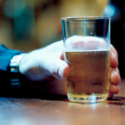Alcohol portrayals in films and advertisements make people drink more
New research has shown for the first time that portrayals of alcohol in films and TV advertisements have an immediate effect on the amount of alcohol that people drink.
The research, published online in the journal Alcohol and Alcoholism, found that people who watched films and commercials in which alcohol drinking featured prominently immediately reached for a bottle of beer or wine and drank an average of 1.5 bottles more than people who watched films and commercials in which alcohol played a less prominent role.
Scientists in The Netherlands and Canada conducted a randomised, controlled trial in which they allocated 80 male university students, aged 18-29, to one of four groups; 20 watched a film (American Pie) in which characters drank alcohol 18 times and alcoholic drinks were portrayed an additional 23 times, and a commercial break that included ads for alcohol; 20 watched American Pie and a neutral commercial break with no alcohol ads; 20 watched a film (40 Days and 40 Nights) in which alcohol appeared far less prominently (characters consumed it three times and alcoholic drinks were shown 15 times) and a commercial break including ads for alcohol; and 20 watched 40 Days and 40 nights and a neutral commercial break with no alcohol ads.
The participants watched the films and commercials in a comfortable “home cinema” set in the laboratory, in friendship pairs, and with access to a fridge containing both alcoholic and non-alcoholic drinks. The researchers aimed to replicate the conditions under which people watch TV at home with friends.
Over the period of one hour, those who were exposed to alcohol in both the film and commercial drank an average of nearly three 200 ml bottles of alcohol, while those who watched the neutral ads and the “non-alcoholic” film drank an average of 1.5 bottles of alcohol. The most alcohol anyone drank was four bottles, and the least amount drunk was none.
Rutger Engels, professor in developmental psychopathology at the Behavioural Science Institute, Radboud University Nijmegen (The Netherlands), said: “This is the first experimental study to show a direct effect of exposure to alcohol portrayals on TV on viewers’ immediate drinking behaviour.
“The results were straightforward and substantial: those who watched both the alcoholic film and commercials drank, on average, 1.5 bottles more than those who watched the non-alcoholic film and commercials.
“Our study clearly shows that alcohol portrayals in films and advertisements not only affects people’s attitudes and norms on drinking in society, but it might work as a cue that affects craving and subsequent drinking in people who are drinkers. This might imply that, for example, while watching an ad for a particular brand of beer, you are not only more prone to buy that brand next time you are in the supermarket, but also that you might go immediately to the fridge to take a beer.”
Prof Engels said it was not possible from this study to tell whether watching alcohol on TV also had an effect on people’s longer-term behaviour. “But it implies that if people watch often, and are exposed to these portrayals often, they drink more. We need more research to discover whether it does indeed have long-term effects,” he said.
If other research confirms the findings of this study, then there will be implications for policy. The researchers say that, for instance, banning alcohol commercials might lead to lower drinking levels at home. “Although we obviously do not argue for ban of alcohol portrayals in movies, it might be an idea to explicitly warn people, and especially parents, that (a) movies contain alcohol portrayals and (b) that these alcohol portrayals affect drinking directly,” they write.
They conclude: “Implications of these findings may be that, if moderation of alcohol consumption in certain groups is strived for, it may be sensible to cut down on the portrayal of alcohol in programmes aimed at these groups and the commercials shown in between. Another implication may be that in situations in which this is possible (e.g. cinemas), availability of alcohol should be reduced when movies and commercials contain alcohol portrayal and individuals in a group at risk for problematic drinking are present.”
Prof Engels and his team are carrying out further research testing the effects of alcohol and smoking portrayals in the media (on TV and in films) on their behaviour. “We primarily want to test whether the effects we found are specific to some genres, and whether identification with actors and characters might also play a role. Further, some people are more likely to be transported into the storyline of the movies while some others are more easily distracted, and we want to test whether that makes a difference in terms of susceptibility to substance use cues as well,” he said.
source: http://www.oxfordjournals.org/
